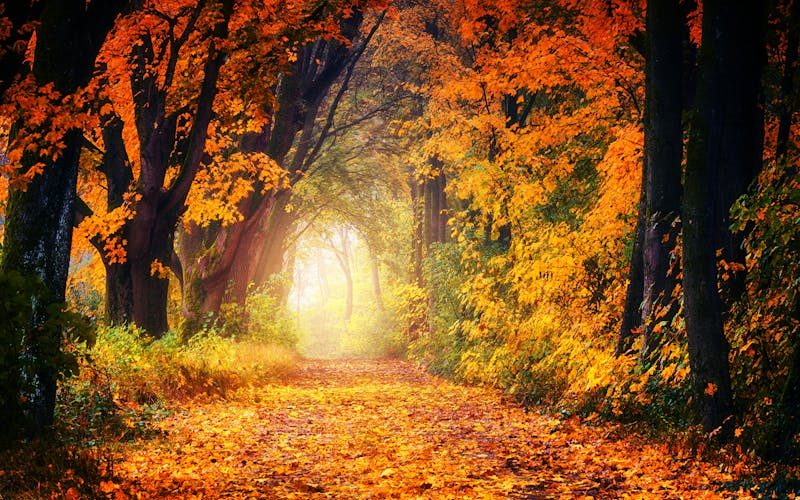In this most rare and radiant of Wisconsin February’s, with record-high temperatures and ample sunshine, my wife has been tapping trees and making maple syrup. I applaud her efforts, and I gratefully ingest the fruit of her labors. The sap has been running steadily, recklessly, almost, overflowing the pails she uses, turning their sides sleek with sweetness.
Meanwhile, the nations pursue their course of burning to the ground. War—in Ukraine and the Middle East—with threats of it broadening like a bloodstain on the robe of the earth. Another contentious election looms in the United States. The shudders of economic instability echo faintly, eerily, while an anti-family, anti-morality, anti-tradition, anti-civilization cultural war of disintegration continues apace. Forces like the World Economic Forum lay brick upon brick of their technocratic totalitarian nightmare.
But there are still trees. Trees that, by some unexpected miracle, draw nutrients from the earth and turn them into clear, crystalline, sweet nectar, pulsing like lifeblood under the bark. In my wife’s process of boiling down the sap into syrup, she has, a few times, brought me a glass of liquid clear as diamond. I’ve heartily drunk that raw sap, savoring the wood and bark and moss and earth distilled and sweetened, redolent of sun and wind and the quiet slumber of deep soil awaiting spring. I’ve thought—I’m drinking a tree.
Victorian poet Gerard Manley Hopkins wrote:
Generations have trod, have trod, have trod;
And all is seared with trade; bleared, smeared with toil;
And wears man’s smudge and shares man’s smell: the soil
Is bare now, nor can foot feel, being shod.
And for all this, nature is never spent;
There lives the dearest freshness deep down things;
When I drink sap from my own backyard, I am drinking that endless freshness. I can feel it.
Suppose that the answers to many of our problems as a culture lie right under our noses, unobtrusive, out of the way, the common miracles, so oft forgotten. Suppose that what we need is to slow down, shut off the media pipeline of overstimulating information, and pay attention to the little things, the primary realities—things like trees and sap and the lilt of a song and a warm hearth with warmer hearts around it. As the wise John Senior wrote, “No serious restitution of society … can occur without a return to first principles, yes, but before principles we must return to the ordinary reality which feeds first principles.”
To be clear, I’m not advocating some kind of political quietism. The political and cultural battles must go on. We can’t give up the fight. But one needs some kind of reserve of hope and energy to draw on in order to keep up the fight, and those reserves, I believe, lie in a love of the common things. Aren’t they what we’re defending, after all? Moreover, to really change a nation or a world, you must first change hearts. And as philosophy professor John Cuddeback says, people are not changed by hearing a message—or at least not just by that. People are changed by an experience, an experience of what authentic human life really is.
And authentic human life is built upon the little, humble things: a baby pressed against his mother’s breast, a cow lowing in the upper pasture, a trout sipping at the surface of a glittering stream, a community of neighbors coming together to celebrate. These simple things will endure. They are eternal. Empires rise and fall—but rivers run on, and apples glint amidst autumn leaves, and a father rocks his child to sleep, and some brave voice begins to sing in the fields. These things will endure.
But, some may object, we face world-ending forces. Nuclear apocalypse or what have you. That may be—I can’t say. Only God knows. But even if some catastrophe lies ahead, I believe it will be the humble things, the overlooked ordinary realities of human life, that will matter in the end. And it will be a return to them, a new cherishing of them, that might hold us back from the precipice to begin with. It was forgetting them that got us here in the first place.
Nature has a way of renovating everything, given enough time. I remember seeing a documentary with footage of Chernobyl. The nuclear power plant is long-abandoned due to the radiation, but animals are returning to it. Life is returning to it. An ashen, empty street—but there, a flash of brown fur, and the glassy eyes of a deer. And there, a burst of green growth pushing through broken blacktop.
In Cormac McCarthy’s postapocalyptic novel The Road, a father and a son wander through a scorched America. All is dust and ash and darkness—except their love for one another. And the love between a father and a son is not such a complicated matter, nor is it so terribly difficult to foster. We might begin there.
Revival must start with beginnings, with first things, like a father and a son and their love. Maybe we ought to turn our gaze to such universal and profoundly good realities, both in order to restore society and to store up reserves for hard times ahead. It isn’t so hard to do. We can start today. We can start by looking—at the soil, at the stars, at the faces around us, all of which are here by some cosmic impossibility, a gratuitous gift.
The sweet nectar of life flows quietly and invisibly through the substance of the world, all around us, with astonishing abundance. We just have to tap into it.
—
Image credit: Pexels


















